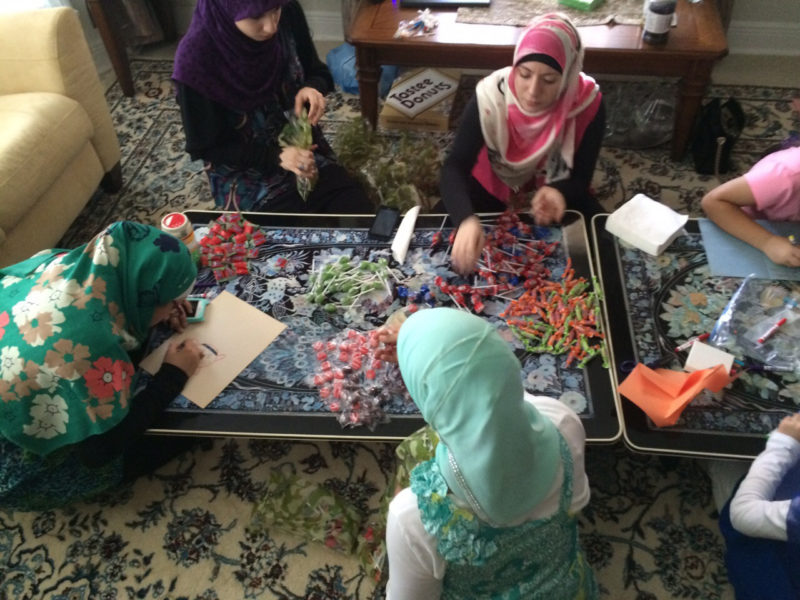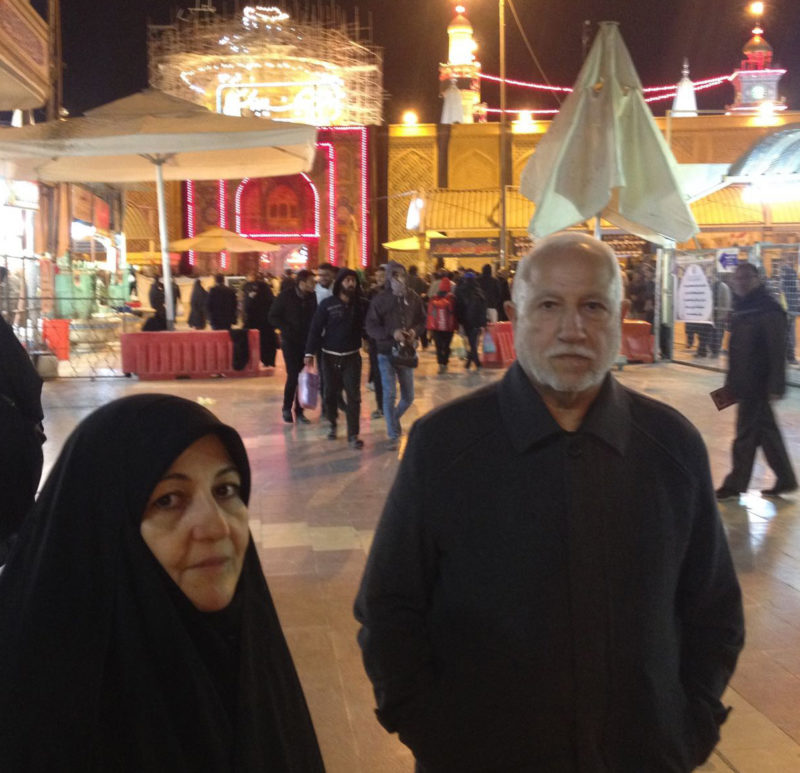There is a familiar smell of saffron, seven spice, and cardamom that fills the air at the masjid. I open the door and hold it for my mother to step in first. Women cloaked in black rush over to greet her as she is one of the “wise ladies” and has rightfully earned that title.
Looking past the gate of women waiting in line to hug my mother, I see a huge muddled mass of more ladies, some squatting on the floor mixing huge cauldrons of food, enough to feed hundreds, and perfecting their spices. Some women are sneaking sweets from a nearby cart and chat on the sides to avoid ongoing traffic of children playing tag and women darting past them. A few more are bickering over “kitchen politics.”
They urge us to come inside with beautiful sincere smiles. While the gathering is meant for a solemn note, they seem to be happy to see one another. Immediately the energy is transferred, and I am, too.

Young women at the local center gather to draw cards and assemble goodie bags for the Women’s Battered Shelter of NOLA in aims to do something charitable during the holy month of Ramadan. Photograph by Farah Alkhafaf.
I’ve lived with these women my entire life. Each one of them has helped raise me. They supported my ambitions, prepared my food, taught me how to read and write in Arabic, threw birthday parties for me, and offered genuine advice as if I was one of their own children.
Salams begin to chirp in the kitchen. I walk to one group and interject while one lady is in the middle of her speech. I started off with a Salam Alaykum, peace be upon you, and a hug following three cheek kisses. Some small talk arises as they look at my garb and adjust my hijab. “Make sure you look presentable before you go into the main hall,” one Khala advised. Another started off, “How is school going? Why don’t you come more often? Is this what we should expect from every engaged girl? …By the way, how is your fiancé?” Trying to get out of the conversation and out of the way of hot pots and panicked women, I answer each question with a short reply and bid them farewell.
Walking a bit past the huddled group and down the hall, I find my sister standing with an amused look on her face, waiting for me to join her. She got through her rounds of Salams much quicker than I had. We started to walk towards the main hall and can slowly begin to hear the speaker’s voice intensify, when another group stopped us, the children.
My sister and I had taught and mentored most of them and each were excited to see me after my year of vacancy in Sunday school. I brush them off kindly and tell them to share all their latest updates after the program, since my mother who has by now already found a comfortable seat in the main hall will ask for us to join her soon. My sister and I go to take off our shoes when we meet two other women. Holding their toddlers in hand, we go to say our Salams as they quickly begin to scope my sister and me for any signs of imperfections: hijab crinkled, mismatched socks, inappropriate color beads. Dark eye circles and acne… “You look very thin and tired! Has school been the cause of this or the new husband?!” And they cackle as I walk in barefoot into the pure area, the main hall- where my community congregates to pray. Scanning the room for my mother in a sea of black, I feel like a child again, desperately searching for her familiar face. One kind Khala nudges me in her direction. Spotted! That motherly beam cannot go missed.
Even though programs lasted about an hour, my friends and I never had the patience to stay still inside the main hall while we were growing up. The sermons are spoken in thick Arabic, closely resembling the standard Arabian dialect, and we always found trouble following along. My generation is used to communicating through broken Iraqi mixed with English. But the parents found comfort when listening to the melodic mother tongue. For a brief moment, if they closed their eyes, they could feel as if they were sitting in Iraq during the 70s when the land was stable and their troubles were few.
My mother, Ikbal Mohammed, recollects her homeland right before her escape in the 1980s:
The Iraq and Iran War was going on then. There was a travel ban on everyone because if people left, who else would fight? The government would wait for my class to graduate just so we can go work in the public sectors because they were all emptied since so many people were drafted. The young men were all taken. And the killings began to increase. The pressure on the people increased and people didn’t want to fight anymore. Why would they? Iran is an Islamic government, and they are our neighbors. Iranis didn’t do anything wrong. The war was not accepted by the people. It was an oppressive war. The government was a dictatorship. No one could oppose the war and anyone that would, they would be captured and imprisoned. They would even kill them. There was a major loss in the men in the society. Every man was required to get 3 years of training in the armed weapons and fighting and afterwards they would go and fight. The government waited for students to finish school to take them in for training. When the war started they took all the men: the student that just finished their education, and the workers that had to be pulled away from their occupations. The system was new and painful.
The Iraqi government needed the women because they didn’t go to the army. My generation supported the education of women. Almost every single woman would reach the university level. Education was really strong in the 70s. People respected the hijabi ladies that went to get their education and to those who wanted to work. The government would urge women to graduate fast. “We need the women to go work and we need the men to go into the army quickly.” The unfortunate men used to say to us, “You will be happy with the graduation. You will start a new life and have a job but for us… we don’t know what will await us.” The war was oppressed, and it was because of Saddam. But a lot people encouraged him. The whole world became against Iran. The war was extremely unfair.
At our masjid in the suburbs of New Orleans, the elders relaxed around those of their people. Born and raised in a distant land and given no choice but to flee is no easy task on any person. My mother describes the bittersweet anguish she endured when leaving behind her home and accepting an unknown fate:
The person who had the chance to flee was lucky. I was lucky. I was about 22 and consider myself to have finished school even though I didn’t have a graduation ceremony. Our last couple years as student were really messed up because there was a lot of sabotage and spying going on. There were a lot of gaps. We go and the professor isn’t there. We go and class is canceled. We go and there aren’t any students. We go and there’s… something.
Students were pressured to sign up with the Baathist party and to report on their peers, even their parents and siblings. We never signed up and never allowed ourselves to be in this position. I personally know friends who spied on me. Tens if not hundreds of reports were written about me because the Baathist party would force them. My friend would come speak to me and I knew it wasn’t normal because she would talk to me for a couple of days and leave me. Why would she come and go so easily? The topics that she would bring up was very obvious. They would ask me what magazines I read so it was apparent what thoughts I held. Imagine how much I had to be suspicious and cautious about what to share and what to talk about. We couldn’t speak openly; we were afraid from the neighbors and our friends and our workmates. We stayed quiet and didn’t speak until we got into the car. I don’t know how we lived through that, with the way we tied our hijabs and how we would go to school and we were very visibly against the leadership.
We didn’t have faith in anyone anymore. It felt like we were imprisoned. I didn’t feel like I was very upset that I was leaving. I was happy. But in actuality, I cried a lot. Because I felt…when will I be able to return? I didn’t know when I could go back. I left without saying goodbye to my friends and relatives. Only my sister, Um Bashar, knew we were leaving. No one came to say goodbye to us and we didn’t say goodbye to anyone either. We didn’t tell anyone we were leaving, not our work mates or friends. We didn’t have faith in anyone anymore. It felt like we were imprisoned.
Our community is comprised of followers of the Jaffari school of thought, commonly known under the umbrella of the Shia sect. Shias are a minority group in Islam that started when Prophet Muhammed (pbuh: peace be upon him) passed and the successorship of the Islamic nation was under debate. The Shias followed Ali ibn Abu Talib, the cousin of Prophet Muhammed and the Sunnis followed Abu Baker, a companion of the Prophet. From then until now, persecution and oppression shadowed the followers of Imam Ali. Imam Ali and his progeny led a spiritual and revolutionary movement that challenged present caliphs through their divine wisdom and knowledge. The true followers of the Ahlulbayt are still targeted today. The elders of our community were targeted for their religious beliefs and were given no other choice but to migrate elsewhere.

Ikbal and her brother standing in front of Imam Ali’s shrine in Najaf, Iraq (undergoing construction) in the winter of 2016. Photograph by Farah Alkhafaf.
 New Orleans Startups
A brief overview of the growing New Orleans startup scene. This piece highlights the main industries of New Orleans, competing cities, and just how emerging the current entrepreneurial/startup scene is in New Orleans.
New Orleans Startups
A brief overview of the growing New Orleans startup scene. This piece highlights the main industries of New Orleans, competing cities, and just how emerging the current entrepreneurial/startup scene is in New Orleans.
 A Bin in Every Classroom: Why Tulane Should Lead on Composting
I asked a peer, Isabel, for her thoughts on composting: “Why do...
Tulane
A Bin in Every Classroom: Why Tulane Should Lead on Composting
I asked a peer, Isabel, for her thoughts on composting: “Why do...
Tulane